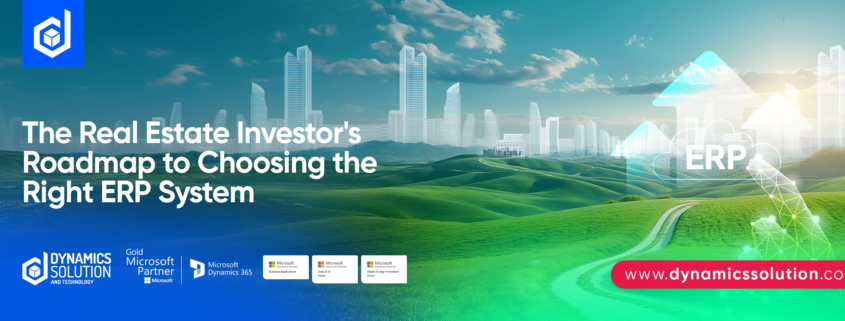The real estate industry experienced a significant rise a few years ago. Suddenly, buying and selling property became a global trend, opening new horizons for this sector. With the increase in real estate investments, new challenges emerged, one being the sheer volume of data, which makes it difficult for real estate investors to balance the demands of multiple properties while staying in touch with tenants. A study shows that 70% of real estate professionals feel overwhelmed by the amount of data they need to manage. Most of the time, it’s not the lack of effort but the absence of the right tools that becomes a hinderance in your success.
Therefore, in a world where every business has undergone a renaissance of innovation, the real estate sector is no different. That’s why it is important to keep up with the industry trends and embrace new tools and software, just like an Enterprise Resource Planning (ERP) system; a powerful software solution designed to bring order to chaos, streamline operations, and enhance decision-making.
However, with numerous ERP systems available on the market, finding the perfect fit can be daunting. In this blog, we’ll embark on a journey to understand the critical steps in choosing an ERP system tailored for real estate investments, weaving through the intricacies and ultimately arriving at a solution that stands out in today’s market.
Identifying The Unique Needs of Real Estate Investors
Imagine being a real estate investor who is working on large projects simultaneously and juggling various tasks without a guiding hand can become a mess. Your days might look like a blur of managing property listings, tracking finances, maintaining tenant relations, and overseeing project timelines. Each of these responsibilities is crucial, yet when tackled through separate spreadsheets or disparate software tools, they lead to inefficiencies and miscommunication.
Understanding core requirements forms the backbone of effective real estate management. A comprehensive approach to property management that encompasses lease tracking, maintenance requests, and financial oversight is essential. A survey by the National Association of Realtors highlights that 58% of agents cite technology as a key factor in managing client relations and transactions more effectively. This statistic accentuates the pressing need for a unified system to alleviate the pain points inherent in real estate operations.
The Quest for Evaluating ERP Features
Armed with a list of needs, the next step is evaluating potential ERP systems. Not all systems are created equal, and certain features are non-negotiable for real estate investors.
Consider integration capabilities; a well-chosen system should link effortlessly with other tools you already use, such as accounting software and customer relationship management applications. Scalability is equally crucial. The selected system should accommodate growth as businesses upscale, whether that means handling increased transactions or adapting to more complex operational needs.
User experience matters too. An intuitive interface allows your team to adapt quickly, minimizing lost productivity during the transition to the new system. Customization features can also enhance effectiveness, allowing you to tailor the system to the specific nuances of your operations. Remember, a one-size-fits-all approach is rarely effective.
The Implementation Roadmap to Success
Now, envision the transition process. Successfully implementing an ERP system is more than just technical installation; it’s akin to setting a new path for your business. A smooth implementation requires a thorough plan, starting with adequate training and onboarding.
One of the biggest pitfalls in transitioning to a new system is the resistance to change. Your ERP provider should supply comprehensive training resources, ensuring that your team is well-versed in the new processes. Additionally, customization and integration into your existing workflows should be carefully evaluated.
Understanding the timeline and costs associated with implementation has multiple dimensions. In a realm where budget overruns can be commonplace, clarity regarding licensing fees, consulting costs, and the potential for ongoing maintenance should never be underestimated.
Then there’s the matter of ongoing support. Be vigilant in checking the support channels offered by the ERP provider. A service level agreement (SLA) detailing response times and assistance options is critical for ensuring that you’re never left in the lurch.
The Search for the Right Fit
With your criteria established, it’s time to dive into market research. Comparing various systems involves analyzing features, pricing, and user reviews. Strong vendor reputation becomes a beacon in this quest. Look for systems that have documented success among your peers in the industry.
Demos and trial versions of ERP systems can provide invaluable insight into their functionality. The user experience during these demos can tell you a lot about how intuitive the system is, is it user-friendly, or do you feel overwhelmed? While cost shouldn’t be your only deciding factor, assessing total cost of ownership including licensing, implementation, and maintenance is integral to finding the best value.
Why Choosing the Right ERP System Matters?
Amidst our exploration, one solution that stands as a formidable contender is Microsoft Dynamics 365 ERP. This comprehensive system is often hailed as the ideal choice for real estate investors due to its rich features and adaptability.
It provides all capabilities to integrate property management, financial tracking, and tenant communications, enhancing the efficiency of your operations. What sets it apart further is its customization ability; the software molds itself around your unique requirements, ensuring that you’re never forced to adapt to limitations. It is also built to grow alongside your business, accommodating an increase in transactions and complexities without a hitch.
An integral advantage is its superior integration capabilities. Being part of the Microsoft family means that Dynamics 365 ERP seamlessly meshes with other Microsoft tools you may already employ, reducing friction in your overall workflow.
Finally, Microsoft’s commitment to customer support adds an extra layer of assurance. Extensive documentation and dedicated service teams ensure that you always have guidance at your fingertips.
Navigating the Road Ahead with Dynamics Solution and Technology
Choosing the right ERP system is a pivotal decision for real estate investors seeking to streamline operations and drive productivity. By systematically identifying your business needs, evaluating essential features, and planning for implementation and support, you take actionable steps toward that goal. Dynamics 365 ERP stands out as a comprehensive choice, offering flexibility, robust features, and dependable support that meets the unique requirements of the real estate landscape.
Empowering your business with a fitting ERP system could be the key to not just surviving but thriving in today’s competitive market. Partnering with Dynamics Solution and Technology as your implementation expert ensures a seamless integration of Dynamics 365 ERP, tailored to elevate your real estate business. Remember, in a field as dynamic as real estate investing, the right tools can be the difference between missed opportunities and unprecedented success. Investing in the proper ERP may be your ticket to streamlined processes and sustained growth. Explore the possibilities with us today, and set your sights on a brighter, more efficient future.







